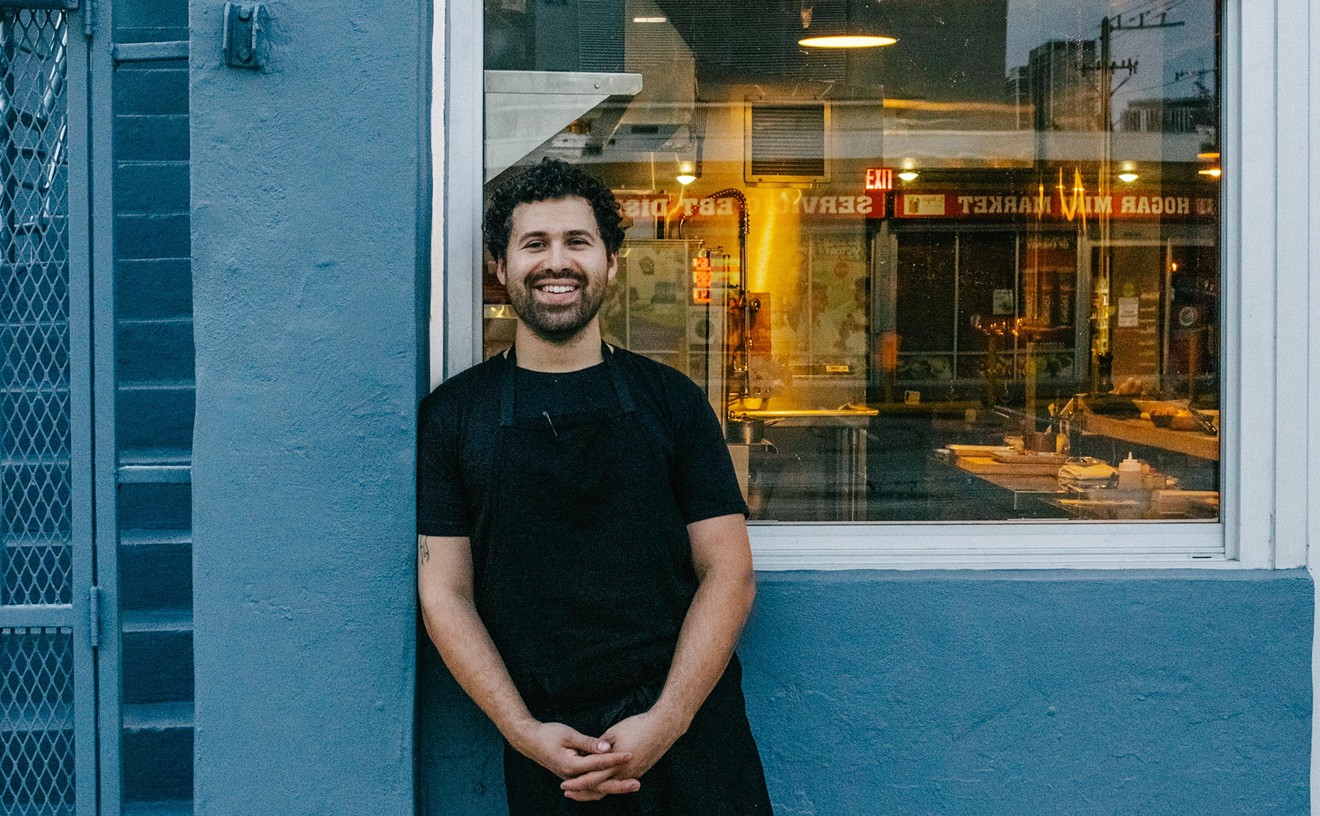Liza and Gennaro "Gigi" Meoli's first restaurant, Ouzo's Greek Taverna, drew plenty of patrons and praise when it opened off Normandy Circle in 2002. But then it closed, and a few years later, the couple resurfaced in the Sunset Harbour neighborhood of South Beach with Ouzo's Mediterranean Bistro. Although the Meoli hospitality was as sunny as ever, dark clouds gathered; more specifically, dark clouds of dust engulfed them from a nearly impenetrable FPL construction site around their establishment. Most folks didn't want to maneuver through this much of a mess for meze, and the new Ouzo flamed out.
Last December, the resilient twosome (he from France, she from Australia) returned with Anise Taverna, located by the Little River Canal and across Biscayne Boulevard from Red Light. It's been here, it's been there, but this Greek place elicits a gripe that remains the same: It is neither here nor there.
Prior incarnations on the site — Indian eateries Renaisa, Taj Mahal, and Monarch Bay — seemed as if they were situated on the deck of a rickety old boat; the cumulative ambiance over the years can best be described as dank. The indoor room has been reconfigured for Anise, splashed with Greek-restaurant-requisite blue and white paint. Now it is taverna-quaint, yet on most evenings, patrons flock to the outdoor patio. While the canal view doesn't rival that of the Mediterranean, the alfresco vibe does simulate the slapdash cheer of an informal Mykonos eatery. Alas, the waterfront milieu turns out to be Anise's sole exceptional trait — meaning taramasalata by the river is something you can't find elsewhere in Miami, but the taramasalata here is no different from the kind you find at any other Greek restaurant in town.
Diners begin with a complimentary ramekin of marinated black and green olives, a nice salty bite to ignite the taste buds. Starter selections include the usual Greek chorus of spanakopita, saganaki, keftedes (meatballs), and grilled sausages, along with a large catch of seafood choices — imported white anchovies, grilled sardines, bacalao croquettes, and tenderly grilled octopus, whose tentacles are tastily teased with olive oil, lemon juice, and dried oregano. A tall tangle of teeny bait-like smelts were likewise fetching, crisply fried and arriving with a spicy side dip. Anise also serves fresh, standard renditions of hummus, tzatziki, and roasted eggplant, any or all accompanied by warm, thick triangles of pita bread. The smoky eggplant was best, the hummus heavy on tahini (not a criticism, just a note on style). The head chef, incidentally, is Pablo Cittadnia. He's from Argentina.
Anise cooks up moussaka, souvlaki, and the like, but also offers Mediterranean sea bream (royal dorado), Mediterranean sea bass (branzino), New York strip steak with plum tomato and basil salad, and a salumi plate proffering prosciutto "de Palma." The whole fish are grilled and splashed with latholemono (olive oil and lemon juice) and dried oregano; a squeeze of the lemon wedge served alongside would have sufficed. By the time our waiter clumsily filleted the "1.5-pound" bream tableside, there wasn't much fish left — at least not for $28 — but the mild white flakes were undeniably fresh. Thick wedges of potatoes roasted golden brown with lemon juice come plated on the side. Contrary to what some folks might believe, there can be such a thing as too much lemon.
Moussaka is thought to have originated in Greece when Arabs brought eggplants to the region circa the 13th Century, and it has gratified generations of diners around much of the world ever since. Anise's owners, however, believe they have come up with a better way to prepare it: Instead of eggplant and lamb, why not zucchini and beef? Granted, beef is not that unusual a substitute, even if it is clearly a trade down. But zucchini for eggplant? Please. Plus there was enough melted cheese on top that if you added some chili powder, this moussaka could pass muster as a Tex-Mex casserole.
The only lamb here comes in the form of grilled chops (chicken is used in the souvlaki, beef in the faux pastisio). The last Saturday of each month, however, brings an outdoor lamb roast, an all-you-can-eat affair with Greek salad, lemon potatoes, and a glass of wine for $35 per person. That's a fine deal.
Desserts are also priced in friendly fashion: $6 fetching baklava, creamy chocolate pudding with hints of anise, or a sweetly satisfying, sugar-drenched coconut cake. Coffee, too, is only $2 per organic American cup, $3 for Turkish/Greek style. And homemade anise biscotti come with it.
The pricing structure for the rest of the menu is more problematic. On one visit, a guest and I had two appetizers and two entrées between us (smelts and dips; dorado and moussaka). The bill with tax was $76.58. Add a modest tip and it's $45 per person. Bottled water, beer, wine, coffee, or dessert? Most folks have at least one of these with dinner. Like so many of our mid-end establishments, Anise delivers a laid-back, mostly pleasant dining experience with friendly, unprofessional staff serving basic (ethnic) comfort fare — but not at great value.
This isn't said with lack of empathy for the restaurateurs, who have to tackle high rents and the inevitable and endless expenses that this biz incurs. But great service costs the same as average service, a memorable moussaka costs the same as a forgettable one, and fish pulled from South Florida waters can be grilled Greek-style to similar effect as those flown in from the Med — without patrons having to pay airfare.
To put it another way: We're not in 2007 anymore.










